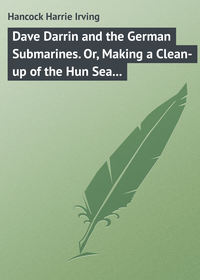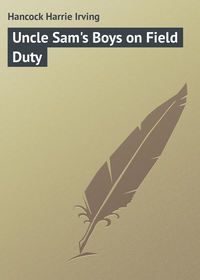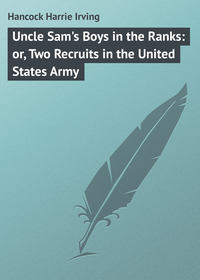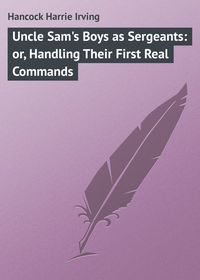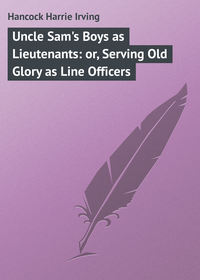 полная версия
полная версияThe Motor Boat Club in Florida: or, Laying the Ghost of Alligator Swamp
The “Restless” was rolling and pitching considerably, but as yet the motion was no more than was agreeable to those who love the sea and its moods. As Ham came up on deck, however, he saw that the life-lines had been stretched. That had been Joe Dawson’s last work before turning in.
“You’ll want to keep awake to-night, Ham,” called Tom, when he saw his dark visage.
“Yassuh! yassuh!” came willingly from the colored man, who, however, could go to sleep standing up anywhere.
Though none of the passengers below was exactly afraid, none cared to turn in early that night. After the men had smoked as much as they cared to, the quartette in the cabin started a game of euchre.
Tom, who had last been relieved at seven o’clock, in order that he might go below for supper, kept at the wheel alone, until eleven o’clock. Then, catching sight of the steward’s head through the doorway of the motor room, he shouted the order to call Joe Dawson on deck.
Joe came with the promptness of a fireman responding to an alarm. He took a look about him at the weather, then faced his chum.
“Between Marquesas and Tortugas?” he asked.
“Yes. Look!”
At just that moment the red eye of the revolving light over on Dry Tortugas, some miles away, swung around toward them.
“I’m glad the gale has held off so long,” muttered Joe. “This is the nastiest part of the way. Half an hour more, if a squall doesn’t strike us, and we’ll be where we’ll feel easier.”
“It’s queer weather, anyway,” said Skipper Tom musingly. “I figured we’d be in the thick of a souther by eight o’clock.”
“Maybe the storm has spent itself south of us,” ventured Joe Dawson, but Halstead shook his head.
“No; it’s going to catch us. No doubt about that. Hullo! Feel that?”
The first drops of rain struck the backs of their necks. Nodding, Dawson dived below, coming up soon in his oilskins and sou’wester. He took the wheel while Tom vanished briefly for similar clothing and headgear.
Swish-sh-sh! Now, the rain began to drive down in great sheets, illumined by two faint flashes of winter lightning. Immediately afterward came a rush of wind from the south that sang loudly through the rigging on the signal mast.
“Now, we’ll soon be in for it in earnest,” muttered Tom Halstead, taking the wheel from his chum and casting an anxious look for the next “red eye” from the revolving light over on Tortugas.
Voices sounded on the after deck. Henry Tremaine was calling to his wife and ward to get on their rain coats and come up for a brief look at the weather.
“Joe,” muttered the young skipper, sharply, “go back to those people and tell them the only place for them is going to be below. Tell Mr. Tremaine he’d be endangering the ladies to have ’em on deck, even for a minute or two. Push ’em below and lock the after companionway, if you have to!”
Joe easily made his way aft ta carry out these instructions. Hardly had Dawson returned when another and greater gust of wind overtook the “Restless.” Her nose was buried deep in the water, as she pitched. Then, on the crest of the following wave, the little craft’s bow rose high. The full gale was upon them in five minutes more – a wind blowing fifty-five miles an hour. Running before the wind the cruiser steered easily enough. Tom could manage the wheel alone, though Joe stood by to lend a hand in case of accident or emergency.
Up onto deck stumbled Ham Mockus, clutching desperately at the deck-house and life-lines.
“Fo’ de Lawd’s sake, dis shuah gwine finish us!” yelled the steward in terror. He was so badly frightened, in fact, that both boys felt sorry for him.
“Don’t you believe it,” Captain Tom bellowed at him. “We’ve been out in a heap sight worse gales than this.”
“In dis boat?” wailed Ham, hoarsely.
“Right in this boat, in one worse gale,” replied Halstead, thinking of the September northeaster experienced on the other side of Florida, as told in “The Motor Boat Club and the Wireless.”
“But Ah reckon ole Marse Satan didn’t gwine ride on dat gale,” protested Ham Mockus.
“Nor on this gale, either,” rasped Halstead, sharply.
“Den yo’ don’ know,” retorted the steward, with an air of conviction. “Yo’s all right, Marse Tom, but yo’ ain’t raised on dis west coast like Ah wuz.”
“Get below,” counseled Joe Dawson. “You’ll drown up here, Ham.”
For, by now, the decks were awash, and there was a threat that, at any moment, the great combers would be rolling fairly across the bulwarks. Dawson drove the black man below, forcing him to close the motor room hatch.
Five minutes later, however, the hatch opened again, and Oliver Dixon appeared in rain coat and cap.
“I thought you might need an extra hand up here,” volunteered Dixon, speaking in a loud voice to make himself heard over the howling gale. “So I told the ladies I’d come on deck for a while.”
“No, we don’t need anyone, thank you,” Tom shouted back at him. “We’ll soon be past Tortugas, and then we’ll be in open waters for hours to come.”
Yet Dixon showed no intention of returning below. Tom Halstead did not like to order him below decks. Dixon, making his way to where he could lean against the cabin deck-house, was not likely to be at all in the way.
“There’s no accounting for tastes,” muttered Joe, under his breath. “If I were a passenger on this boat, and had a snug cabin to go to, that would be good enough for me. I wonder why I dislike this fellow so?”
By the time that they had the Tortugas light well astern Captain Tom jerked his head slightly, backward, then glanced meaningly at his chum before looking straight ahead.
“Yes; we’re in the open,” nodded Joe. “Good!”
Yet the gale, if anything, was increasing in severity. Staunch a craft as she was, the “Restless” creaked almost as though in agony. Timbers will act that way in any heavy sea.
“Take the wheel, Joe!” shouted Skipper Tom, presently. “My arms ache.”
And well they might, as Joe knew, for, with such a sea running, the wheel acted as though it were a thing of life as it fiercely resisted every turn.
As Dawson stepped into place, bracing himself, and with both strong young hands resting on the spokes, Tom Halstead, holding lightly to one of the life lines, started to step backward to the deck-house. Just then a great, combing wave broke over the boat, from astern, racing the full length with fearful force. Joe Dawson, hearing it come, partly turned to meet it. Halstead was caught, lurching as he let go of the life line to clutch at the deck-house. Dixon’s foot shot out, tripping the young skipper. Losing his footing and deprived of grip at the same instant, Tom Halstead rose on the billow as it swept along.
Over the port side went the great mass of water. It would have carried Skipper Tom with it, all in a flash, but Joe, dropping the wheel and diving to hit the port bulwark, threw his hands upward, clutching desperately at his friend’s leg.
Then Dawson held on – how he gripped!
A moment more and the force of that invading billow was spent. Joe, panting under the strain of that fight against tons of water in motion, drew Halstead to him in safety.
But the “Restless,” with no hand at the wheel, was lurching around into the trough of the sea. The next wave might engulf her.
Sure that his friend was safe, Joe Dawson sprang to the wheel. While he was still fighting with the steering gear, Tom Halstead stood at his side. Between them, not without effort, they put the bobbing little cork of a cruiser on her course, once more, on that seething, boiling stretch of waters.
“Can you hold her, Joe?” panted Tom, huskily, in his friend’s ear.
Dawson nodding, Tom stepped back to Dixon, who regarded the young captain with curiously blazing eyes.
“I think you’d better go below, sir,” shouted Halstead.
“Why – why – do you mean – ?”
“I mean nothing,” retorted Tom, dryly, “except that the deck is no place for you in this weather. We can handle the yacht better if all passengers are below.”
“But – ”
Captain Tom’s eyes gleamed resolutely.
“Will you go below, sir, or shall I have to call the steward to help me put you below? I mean it, Mr. Dixon. I’m captain here!”
Gripping at the lines, Dixon sullenly made his way to the motor room hatch. Halstead swung it open, gently but firmly aiding his passenger below.
“Did he trip you?” asked Joe, when the hatch had been closed and his chum stood beside him.
“It’s an awful thing to say, and I guess he didn’t, but I almost thought so,” Halstead shouted back.
“He’s bad, I think,” growled Joe, which was a good deal for that quiet young engineer to say. “Yet I can’t see any earthly reason for his treating you like that.”
“Nor I, either,” admitted the youthful sailing master. “Oh, of course he didn’t mean to. The whole thing is too absurd!”
Ten minutes later, feeling that it would be better to go below and see how the hull was standing the severe strain, Halstead called to Ham to stand by Joe on deck. Then Tom went below.
Once down there, it struck him to step through the passageway. There was a peep-hole slide in the door opening into the cabin. Halstead stood there, shifting the slide so that he could look beyond.
“If the ladies are still up,” he told himself, “I can see how they are bearing the excitement. If they look very scared, I’ll go in and try to put some courage into them.”
As Halstead looked through the small peep-hole, he saw Tremaine and that gentleman’s wife and ward seated at the further end of the cabin table, bending over a book that Tremaine held open. At the sideboard stood young Dixon.
“Now, what’s he doing?” wondered Halstead, curiously.
With the water bottle in one hand, Oliver Dixon was pouring into it a few drops from the vial he had placed in his vest pocket in the late afternoon.
In the meantime, up on the bridge deck, Joe Dawson at first waited for the return of his chum without any feeling of curiosity. Yet, after many minutes had passed the young fleet engineer of the Motor Boat Club began to wonder what his comrade was doing below.
“Ham,” ordered Joe, at last, “go below and find Captain Halstead. See if anything has happened.”
Glad enough to get away from the deck, where the billows were pouring over and threatening to carry him overboard, the colored steward made his way, clutching at the life-lines, to the motor room door.
“Get that hatch shut!” roared Joe. “Don’t leave it open for a five-ton wave to get down in there at the motors!”
Ham shut the hatch with a bang, then ran through the passageway to the cabin door.
“’Scuse me, ladies an’ gemmen,” begged Ham, poking his head through the doorway. “Any ob yo’ done seen Cap’n Halstead?”
“Why, no,” replied Mr. Tremaine, looking up. “He hasn’t been through this cabin – at least, not within the last hour. Isn’t he on deck?”
“No, sah. Marse Dawson, he-um up at de wheel. He gwine sent me heah to look fo’ de cap’n.”
“You were forward, a while ago, Dixon,” spoke Mr. Tremaine. “Did you see Halstead?”
“Not even a glimpse of him,” replied that young man.
“Is the captain lost?” demanded Mrs. Tremaine, a tremor in her tone.
“I’se spec he must be,” declared Ham, solemnly. “He-um ain’ forrard, an’ he-um ain’ on de bridge. He-um ain’ here, neider.”
“Don’t alarm the ladies, Ham,” spoke Mr. Tremaine, sharply. “If Captain Halstead came below, then of course he didn’t go overboard. Look forward. If you don’t find the captain promptly, come back for me, and I’ll help you.”
Ham departed, going back through the passageway. Then, emitting a frenzied yell, shaking in every limb, Ham half lurched, half tottered back into the cabin. His appearance of utter fright was such as to cause the ladies to rise, holding to the table for support while the boat rocked and dipped.
As for Ham, he fell against the sideboard, holding on there, his eyes rolling wildly, until little more than the scared whites of them could be seen.
“What do you mean, you black idiot?” roared Mr. Tremaine, darting at the steward and clutching him, administering a sound shaking.
“Cap’n Halstead, he ain’ on board!” wailed Ham Mockus. Then, in a greater outburst of terror, he screamed hoarsely:
“Dat ain’ de worst! De Ghost ob Alligator Swamp am on board – Ah done seen it so close dat Ah s’pec it reach out an’ grab me!”
Though none of the passengers believed in ghosts, this information, at such a time, was enough to make them gasp.
“Wut Ah done tell yo’?” roared Ham, his voice deepening in the frenzy of his terror. “Ah tole yo’-all dat ole Marse Satan gwine ride on dis great wind ter-night! He sho’ is doin’ dat. Oh, Lawdy!”
Slipping from the grasp of Henry Tremaine, Ham Mockus sank groveling to the floor.
CHAPTER III
THE MYSTERY OF THE NIGHT
“COME, get up, you imp!” roared Mr. Tremaine, angrily, as he bent over. He seized the steward by the collar, and dragged that frightened individual to his feet.
“Ham, you simpleton, there’s no such thing as a ghost,” uttered Mr. Tremaine, sharply.
“Oh, ain’ dere, den?” demanded Ham, in high disgust at such ignorance. “Yo’ go out an’ meet it, den!”
“I will,” agreed Henry Tremaine, gripping the negro tightly by the arm. “Where did you see that ghost?”
“In de passageway, sah.”
“Then come along and show it to me.”
Mr. Tremaine spoke with such an air of disbelief and firmness that Ham Mockus began to gather some courage from such leadership.
“But, den, sah, mebbe dat ghos’ don’ show himself to white folks ob de quality kind,” suggested the steward.
“If we don’t see the ghost, then you’ve all the less reason to be afraid,” retorted Henry Tremaine. “But come along and see whether you can show the ghost to me.”
As Tremaine marched the badly scared steward out into the passageway, the ladies started to follow, out of sheer curiosity. So badly was the yacht rolling that Dixon went with them, to steady them and save them from being pitched headlong.
“It was right erlong in dis passageway, sah,” Ham offered solemn assurance. “An’ Ah done heard a feahful sound – o-o-o-oh!”
Ham suddenly gave a bound that took him out of Tremaine’s clutch. He darted to the forward end of the passageway, then halted, crouching, his eyes rolling almost as fast as the propeller shafts could revolve.
Unquestionably there had been a sound. Henry Tremaine, far from superstitious, thought he had heard the same sound. As he halted, rooted to the spot, he heard a distinct knocking.
“There’s something at the other side of this closet door,” spoke Tremaine, with a positive air. Reaching out, he drew out the hook by which the door was secured in place. As he pulled the door open, Tom Halstead, looking more than half dead, lurched out of the little compartment in which he had been a prisoner. Tremaine caught him and steadied him.
“What’s the matter, lad?” demanded the charter-man.
“Air,” whispered Halstead, hoarsely. “Nearly died in there!”
“Your fans – quick, ladies,” cried Mr. Tremaine.
Out where the ventilators were working, the youthful sailing master was quickly revived. Then Mr. Tremaine led him back to the cabin, and dropped him into a seat, while the ladies plied their fans vigorously.
“Oh, I guess I’m all right, now,” protested Skipper Tom, looking up with a smile.
“But how came you in that place?” questioned Mr. Tremaine.
“Why, one of our air compartments is in that place,” muttered Tom. “I stepped in there, just to make sure that all was right. While I was there the yacht lurched and the door slammed to. The hook on the outside must have been standing up. Then it dropped, fitting just into place. I made an awful racket, hoping to attract someone’s attention. Then I began to get dizzy for lack of air.”
“That was what that idiot, Ham, thought was the noise the ghost made,” grimaced Mr. Tremaine. “But, good heavens, Halstead! What a fearful accident to have happened. And, here in the cabin, we couldn’t hear your clatter on this night of all nights.”
“Joe could have brought you through, I guess, sir,” Tom smiled. “Yet I’m glad I didn’t smother in there to-night. It’s much safer, in a gale like this, to have two men on the bridge deck. I’m going back there now.”
“Are you steady enough?” asked Mrs. Tremaine.
“Oh, I’m all right,” vaunted Halstead. “I’ll go up on deck, now, and feel better for the air.”
Mr. Tremaine insisted on going forward with him as far as the motor room hatch, seeing the young skipper safe out on deck. Then the charter-man turned upon Ham, whose eyes were rolling at a more furious rate than ever, and dragged him back to the cabin.
“Ham, you infernal scared-cat!” roared Tremaine, as he stood the steward up by the sideboard. Then the charter-man explained what really had happened.
“Yet you said you saw a ghost!” finished Mr. Tremaine.
“Ah done t’ought Ah did, we’en Ah heahed dat awful noise,” chattered Ham Mockus.
Tom Halstead’s condition rapidly improved as he groped his way to Joe’s side on the bridge deck, and stood gulping in great draughts of the air that was blowing so forcefully about him. Next, he shouted, in his chum’s ear, an account of what had happened to him.
“Mighty curious,” Joe bawled back, with a shake of his head. “About one chance in a million, I should say, that the door could close and hook itself.”
“How else could it have happened!” Halstead demanded.
At that, Joe had to admit that he had no theory of his own to fit the case. While they were still talking about it, Henry Tremaine, in rain-coat and visored cap, opened the hatch, and came out onto the deck.
“Keep hold of the life-ropes, sir,” Tom yelled at him. “Look out for this wave coming!”
Such a great weight of water rolled in over the low stern, flooding swiftly forward, that the “Restless” went low in the sea ere the salty ebb went out through the running scuppers.
“The weather’s growing stiffer, isn’t it?” demanded Mr. Tremaine, after the deluge had passed.
“Not growing any better, sir, anyway.”
“I’ve just told the ladies the weather is moderating a good deal,” Tremaine went on, talking at the top of his voice, in order to make himself heard. “They haven’t lost their courage yet, and there’s no sense in their being allowed to get scared. They won’t turn in, though. Say they’d rather sit up until the boat pitches a good deal less. Do you consider that there’s any real danger to-night, Captain?”
“Yes,” admitted Tom, honestly.
“What is it?”
“Why, the ‘Restless,’ I believe, sir, is fully staunch enough to weather such a gale if she can be kept going ahead. Yet the force of the rolling water to-night is something terrific. If our propeller shafts snapped, under the strain, and we drifted in the trough of the sea, I don’t know how long we could keep afloat.”
“That’s the only danger?” asked Henry Tremaine, eyeing the young sailing master keenly.
“That’s the greatest danger, sir.”
“What are the others?”
“Why, sir, some of the hull timbers might be forced so that a leak would be sprung, or, of course, we might go onto some uncharted reef or rock. This is a mean bit of coast to sail on with no local pilot aboard.”
“You’re not afraid of disaster, are you, Captain Halstead?”
Tom’s smile was swift and reassuring.
“I expect, sir, to land you at some point in Oyster Bay by breakfast time,” answered the young commander.
For some moments Henry Tremaine studied the clean, clear-cut face and steady, resolute eyes of Captain Tom. Then he glanced at the sturdy, unflinching figure of Joe Dawson at the wheel.
“Halstead,” the charter-man shouted back, “since I have to be out here on rough waters, and in the big blow, I am glad I’m with you two. I couldn’t be in braver hands. When I do turn in to-night it will be to sleep soundly.”
How true the latter part of his prediction would come Tremaine could not guess as he groped his way down below.
This night of hurricane was full of dangers, even though the propeller shafts should hold and the motors continue to work under the strain. A score of times, at least, each of the young navigators had to fight the grave danger of being lifted and carried overboard on the curling crest of one of the many huge, combing waves that piled over the stern of the “Restless” and dashed thunderously along the low deck of the yacht.
Every now and then, while Tom was at the wheel, Joe went below to look over his motors. Once he found them becoming overheated. It was necessary to slow the speed down to seven miles, and at this lessened gait the boat rolled more than ever. Yet Joe had to fight it out with the motors, even though headway was lost.
When, at last, late in the night, the speed had been put up to nine miles, Joe came up on deck and Skipper Tom went briefly below. He found all his passengers still up in the cabin.
“I just came below,” smiled Captain Halstead, “to assure you all that it will be wholly safe for you to turn in, if you wish. I wouldn’t say that if I didn’t believe it. Mr. Tremaine, we’ve had to slacken the speed for quite a while, to cool our engines, so we won’t make Oyster Bay as early as I had expected.”
The ladies, who could hardly hold their eyes open, expressed a desire for sleep. Tremaine and young Dixon assisted them as far as their stateroom door, then came back.
“I believe I’ll turn in, Tremaine,” yawned Oliver Dixon, just as Tom Halstead, in his sou’wester and oilskins, departed. “Are you going to do the same?”
“After my bed-time glass of water, yes,” nodded the charter-man, groping his way to the sideboard and reaching for the water-bottle.
Ham, still wholly of the opinion that he had seen a ghost, had long ago crept into his bunk in the motor room, covering up his head. He had fallen asleep. Muffled snores from that berth greeted the young skipper as he reached the motor room.
“That reminds me,” muttered Halstead. “I forgot to lock the cabin door into the passageway.”
Retracing his steps, he used his key. This he had done regularly on the cruise so that Ham Mockus, a stranger to all on board, could not, if so tempted, prowl in the cabin after the others had retired. Then Halstead returned to deck.
Through the long night he and Joe, strong and fearless as they were, wrestled with exhaustion, for the physical strain was enormous. They met the duties of the night as only Americans, born on the sea-coast and bred to the salt water ways, can meet such problems. There were times when they believed the pounding seas must snap one of the propeller shafts. With one shaft gone, the other shaft could not long have done double duty on such a night and in such a sea.
At last Captain Tom sternly ordered Joe Dawson below for a rest. Joe came up on deck again, after a nap of an hour and a half, when it was within an hour of daylight.
“Now, you get below,” begged Dawson. “I feel as strong as a horse, Tom. And go back to your berth in the cabin, at that. You know, I have the electric signal to your berth, if I need you.”
Captain Tom stood for some time, regarding the weather and the running sea. But it seemed to him that they had reached a point where the gale was much less severe, and he was aching in every muscle and sinew.
“I’ll go below for a little while,” he assented. Stopping in the motor room long enough to shed oilskins and headgear, and hearing Ham still snoring luxuriously, the young sailing master trod through the passageway, unlocking the cabin door, then locking it again after him.
Captain Tom drifted off into slumber the instant his head touched the pillow in his berth. Nor did he waken. Joe, glad that his chum might rest at last, fought it out all alone on the bridge deck. Daylight was flooding the cabin from the transom overhead when Captain Halstead was roused by hearing Mrs. Tremaine’s voice. Poking his head sleepily through the berth curtains, Tom beheld both ladies fully dressed, while Oliver Dixon was just coming out from the other stateroom.
“We’re riding in much easier water, now, ladies,” was Dixon’s greeting.
“Yes; I noticed that,” replied Ida Silsbee. “And I can’t tell you how glad I am, either. I tried to be brave last night, but I’ll admit I was worried. I’d have been more alarmed, only I realized what a splendid pair of young sailors were looking after – Why, there’s Captain Halstead, drinking in enough flattery to turn his head,” laughed the girl, catching sight of the young skipper.


